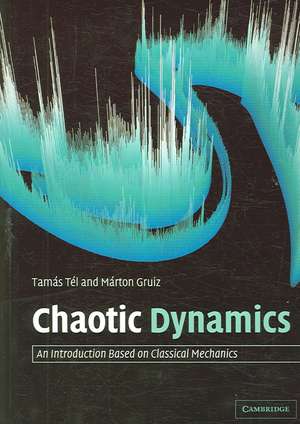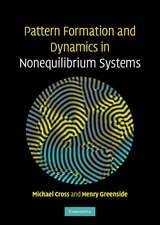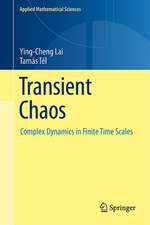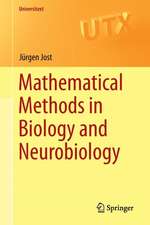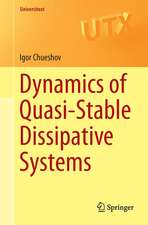Chaotic Dynamics: An Introduction Based on Classical Mechanics
Autor Tamás Tél, Márton Gruizen Limba Engleză Paperback – 23 aug 2006
Preț: 684.74 lei
Preț vechi: 769.37 lei
-11% Nou
Puncte Express: 1027
Preț estimativ în valută:
131.04€ • 136.30$ • 108.18£
131.04€ • 136.30$ • 108.18£
Carte tipărită la comandă
Livrare economică 12-26 aprilie
Preluare comenzi: 021 569.72.76
Specificații
ISBN-13: 9780521547833
ISBN-10: 0521547830
Pagini: 428
Ilustrații: 304 b/w illus. 28 colour illus. 11 tables 150 exercises
Dimensiuni: 170 x 244 x 22 mm
Greutate: 0.86 kg
Editura: Cambridge University Press
Colecția Cambridge University Press
Locul publicării:Cambridge, United Kingdom
ISBN-10: 0521547830
Pagini: 428
Ilustrații: 304 b/w illus. 28 colour illus. 11 tables 150 exercises
Dimensiuni: 170 x 244 x 22 mm
Greutate: 0.86 kg
Editura: Cambridge University Press
Colecția Cambridge University Press
Locul publicării:Cambridge, United Kingdom
Cuprins
Introduction; Part I. The Phenomenon: Complex Motion, Unusual Geometry: 1. Chaotic motions; 2. Fractal objects; Part II. Preparatory Concepts: 3. Regular motions; 4. Driven motions; Part III. Investigation of Chaotic Motion: 5. Chaos in dissipative systems; 6. Transient chaos in dissipative systems; 7. Chaos in conservative systems; 8. Chaotic scattering; 9. Applications of chaos; 10. Epilogue, outlook; Part IV. Miscellaneous: 11. Appendices; 12. Solutions to problems; 13. Bibliography.
Recenzii
'… a well-organised, beautifully illustrated volume covering the main points of chaotic dynamical systems, using intuitive mechanical examples to motivate clear and lucid discussions … It is certainly a book intended to teach or learn from … Throughout the work self-contained text capsules appear, expanding on issues raised in the discussions, and containing excellent summaries, histories, explanations and more potential applications … excellent layout and ordering … I would happily lend this book to any student wishing to begin learning the subject of chaotic dynamics, but I would certainly also demand its return.' Rob Sturman, University of Leeds
'… highly recommended as an introductory text …' Journal of Statistical Physics
'Even though there exists a lot of rather recent book on this subject, this manual is advisable for its clear presentation of the topics and for the simple and rigourous use of mathematical tools. A merit of this book is the cornerstone starting point: classical mechanics, which is the fundamental model for any other dynamical science. The book is planned mainly for undergraduate students of science, engineering and computational mathematics, but in the reviewer's opinion it could be useful to anybody interested in complex dynamics.' Zentralblatt MATH
'The book is excellent and I shall recommends it to my students'. Alistair Borthwick, Department of Engineering Science, University of Oxford
' … the book is thus very well suited to be an introductory text, and can also serve individual learning … It contains especially useful material also for completing a course on theoretical mechanics with regards to chaotic systems.' Dr Arnd Bäcker, Physik Journal
'…extremely engaging and very well suited for undergraduate students with basic training in classical mechanics… The innovative illustration scheme is one of the highlights of the book, particularly for establishing a clear correspondence between phase space behaviour and configuration space behaviour. In my opinion this is a book as no other for undergraduate chaos education.' Adilson E. Motter, Assistant Professor of Physics and Astronomy, Northwestern University
'… highly recommended as an introductory text …' Journal of Statistical Physics
'Even though there exists a lot of rather recent book on this subject, this manual is advisable for its clear presentation of the topics and for the simple and rigourous use of mathematical tools. A merit of this book is the cornerstone starting point: classical mechanics, which is the fundamental model for any other dynamical science. The book is planned mainly for undergraduate students of science, engineering and computational mathematics, but in the reviewer's opinion it could be useful to anybody interested in complex dynamics.' Zentralblatt MATH
'The book is excellent and I shall recommends it to my students'. Alistair Borthwick, Department of Engineering Science, University of Oxford
' … the book is thus very well suited to be an introductory text, and can also serve individual learning … It contains especially useful material also for completing a course on theoretical mechanics with regards to chaotic systems.' Dr Arnd Bäcker, Physik Journal
'…extremely engaging and very well suited for undergraduate students with basic training in classical mechanics… The innovative illustration scheme is one of the highlights of the book, particularly for establishing a clear correspondence between phase space behaviour and configuration space behaviour. In my opinion this is a book as no other for undergraduate chaos education.' Adilson E. Motter, Assistant Professor of Physics and Astronomy, Northwestern University
Descriere
A clear introduction to chaotic phenomena for undergraduate students in science, engineering, and mathematics.
